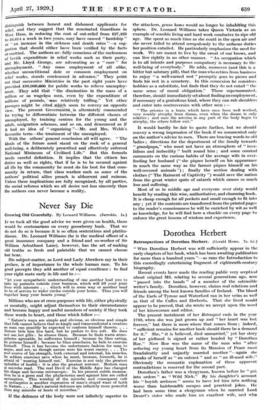Never Say Die
Growing Old Gracefully. By Leonard Williams. (Jarrolds. Is.)
Jr we took all the good advice we were given on health, there would be centenarians on every gooseberry bush. That we do not do so is because it is so often sententious and platitu- dinous. Dr. Leonard Williams (he is the medical officer of a great insurance company and a friend and co-worker of Sir William Arbuthnot Lane), however, has the art of making old truths so fresh and palatable that we cannot choose but hear.
His subject-matter, as Lord and Lady Aberdeen say in their preface, is of importance to the whole human race. To his good precepts they add another of equal excellence : to find your right mate early in life and to :—
" let your sympathetic understanding of one another lead you to take up pursuits outside your business, which will fill your joint lives with interests . . . which will in some way or another tend to be of service to wider circles outside your home. Thus you will together keep your hearts young."
Millions who are at cross-purposes with life, either physically or mentally, might adjust themselves to their circumstances and become happy and useful members of society if they took these words to heart, and those which follow :—
" Nature's ways are simple and obvious, so obvious and simple that folk cannot believe that so kingly and transcendental a creature as man can possibly be expected to conform himself thereto. . . . Nature bids him live hard, but he prefers to live soft. He does not use her gifts : he abuses them. Because he finds warm atmo- spheres agreeable, he suffocates himself ; because he likes eating, he poisons himself ; because he likes armchairs, he fails to exercise himself. Thus it has become the unfortunate fashion for man to argue, and aet,• as though nature were his worst enemy. . .• . The real source of his strength, both external and internal, his muscles, be seldom exercises save when he must, because, forsooth, he is afraid of ' wearing himself out.' Exercise is not only the greatest upholder of health : it is also the greatest restorer. Modern man is microbe mad. The real Devil of the Middle Ages has changed his shape and become microscopic. In his present subtle incarna- tion he is a germ and the phylacteries used against him are called antiseptics. This worship of the microbe and consequent cult of antiseptics is another expression of man's- stupid want of faith in Nature. . . Man's natural defences are infinitely more powerful than any microbe or hosts of microbes."
If the .defences of the body were not infinitely superior to
the attackers, genus home would no longer be inhabiting this sphere. Dr. Leonard Williams takes Queen Victoria as an example of sensible living and hard work conducive to ripe old age. She spent as much time as she could in the open air and she never failed to attend scrupulously to the arduous duties her position entailed. He particularly emphasizes the need for work. We are meant to live by the sweat of our brows, and
can live rightly in no other manner. "An occupation which is to all intents and purposes compulsory is necessary to the well-being of everybody." He adds, moreover (and this is a bitter but salutary pill), that the man who retires from business to enjoy " a well-earned rest " promptly goes to pieces and finds his rest in a cemetery. In this connexion he considers hobbies as a substitute, but finds that they do not entail " the same sense of moral obligation." Those superannuated, therefore, should immediately set about finding an employment, if necessary of a gratuitous kind, where they can rub shoulders and enter into controversies with other men :—
" The arteries in a brain which have once been well worked, very readily atrophy from disuse, even when the disuse is only relative ; and once the arteries in any part of the body begin to atrophy, the others follow suit."
It would. hardly be lair to quote further, but we should convey a wrong impression of the book if we commented only on the author's advice to men. There are bracing words to old ladies ; directions for the deportment of the family towards " grandpapa," who must not have an atmosphere of " inva- lidism and imbecility " built round him ; and some comical comments on the curious habits of the average wife in over- feeding her husband (" she piques herself on his appearance in much the same way as the farmer piques himself on his well-covered animals ") ; finally the section dealing with clothes (" The Raiment of Captivity ") would save the nation from the great winter spate of catarrh which causes so much loss and suffering.
Most of us in middle age and everyone over sixty would benefit by reading this wise, authoritative, and charming book. It is cheap enough for all pockets and small enough to fit into any ; yet if the contents are transferred from the printed pages to the reader's consciousness he will be enriched by wit as well as knowledge, for he will find here a chuckle on every page to enforce the great lessons of wisdom and experience.








































 Previous page
Previous page